Victor Valley
Victorville, California
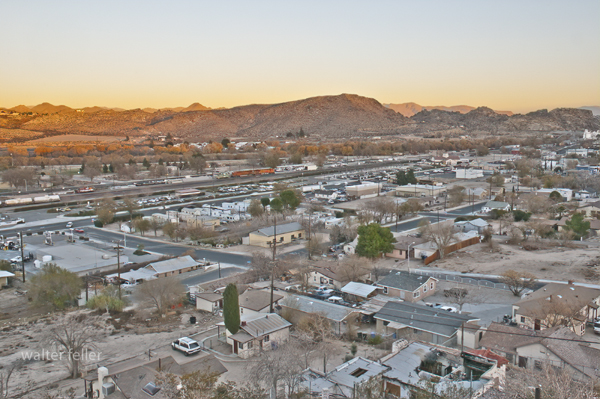
Victorville, Ca. Honoring Jacob N. Victor, construction superintendent of the Santa Fe through the Cajon, the name Victor was given to the railroad's telegraph station and "Y" built a mile northwest of the upper narrows of the Mojave. When the trains came through, probably the only buildings in this area were the Rogers log cabin on the east side and the J. C. Turner ranch to the north.
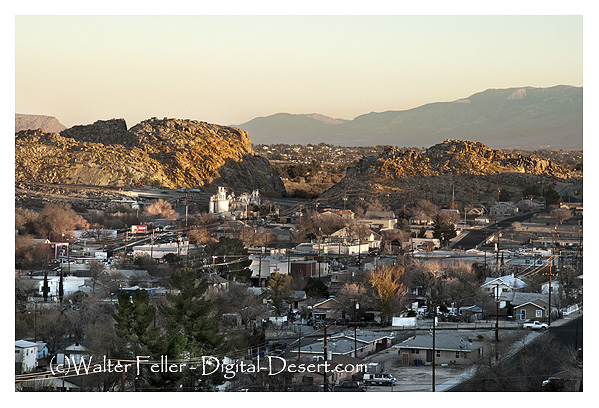
Victorville
This railroad activity was. basis enough for the starting of a small community. A store or two, blacksmith shop and two saloons east of the tracks became the neucleus of a business district which gradually expanded westward. During the surrounding mining activity, the community boasted one of the finest gold stamp mills.
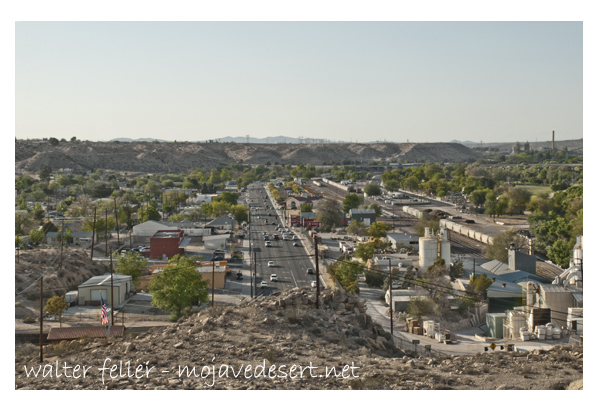
"D" Street - Victorville
In 1901, the post office changed the name to Victorville, claiming there was confusion with Victor, Colorado. Victorville had become the largest community and trading center in Victor Valley, benefitting from increased railroad and road travel, mining and agriculture. In the 1910's and 1920's, Victorville and its "wild west" back country were used for more than 200 movie films.
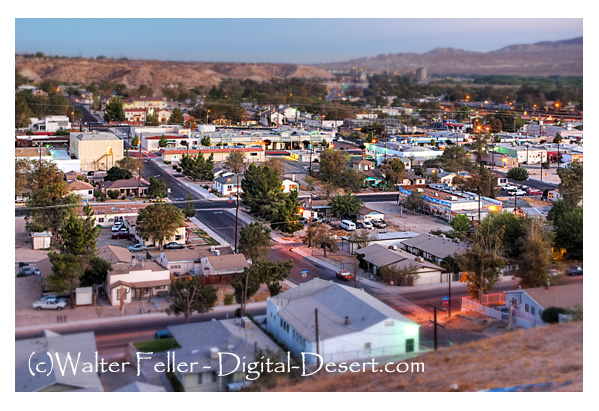
The industrial future of Victorville was assured with the erection in 1917 of the Southwestern Portland Cement Co. plant and this has remained as its leading industry.
Victorville's growth kept pace with that of Southern California during the years that followed. The great surge forward developed immediately after World War II, when smog free desert climate in the high elevation Mojave attracted more and more newcomers. It was inevitable that resort communities would come into being, thus augmenting the economy of Victor Valley. The past ten years has witnessed Victorville's greatest population growth and the expansion of its business and distribution facilities. It is the home of the San Bernardino County Fair, and thousands view the exhibits and the R. C. A. Championship Rodeo.
History of San Bernardino County
by John Brown Jr. - 1922Victorville is a town of about 750 people, and is not incorporated. It lies about in the center of Victor Valley, on the Mojave River, 44 miles north of San Bernardino. The main lines of the Santa Fe and Salt Lake railroads pass through it. The town has good schools, with eleven teachers ; an M. E. church ; a weekly newspaper, the Victor-Valley-News- Herald ; one drug store, ice manufacturing plant, three hotels, and one bank, the officers of which are: C. M. Moon, president; George R. Searls, vice president; John Christenson, secretary; S. A. Hedding, treasurer. There is in Victorville a plant which manufactures fibre from a desert plant commonly called Spanish dagger. This fibre is used for binding twine and rope. Near the town is the Southwestern Portland Cement Company's plant, manufacturing 2,500 barrels of cement per day. At Oro Grande, five miles north, is located the Golden Gate Cement Co.'s plant, with a capacity of 1,000 bbls. per day. The former company employs 125 men; monthly payroll is $20,000; the latter employs 80 men with a monthly payroll of $12,000.
The elevation of Victorville is 2,710 feet. There are about 2,500 acres planted to deciduous fruits in Victor Valley and 1,500 acres of alfalfa and about 8,000 tons were grown in 1920. Victor Valley Union High School District consists of the following elementary districts : Apple Valley, Baldy Messa, Big Bear Lake, Hesperia, Lucerne, Midway, Mirage Valley, Oro Grande, Sheep Creek, Sunrise, Victor. The district has a valuation of $2,644,450.
Victorville Weather
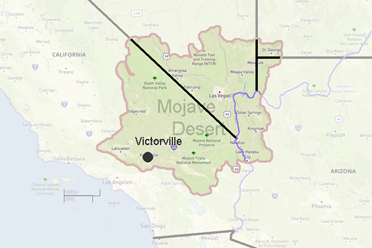
Upper Narrows Bridges
Railroad
Turner Barn
7th & Palmdale Road
Route 66 Mojave River Bridge
Route 66 Museum
Victorville Jail
Old Victor School
Jr. High School Gym (site)
Victorville "V"
Emma Jean's
Green Spot Inn
Fair Sign
New Corral Motel
Memorial Park
Kemper Campbell Ranch
Lane's Crossing
Hotel Smith
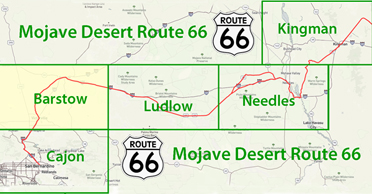
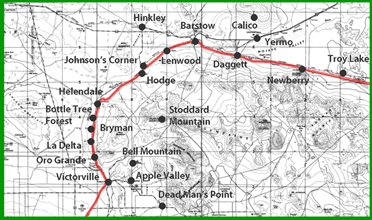
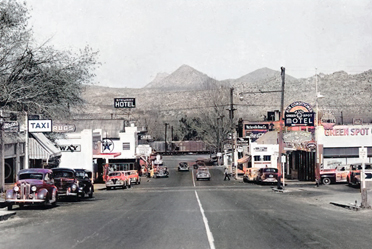
History of Victorville
A very brief history of the City of Victorville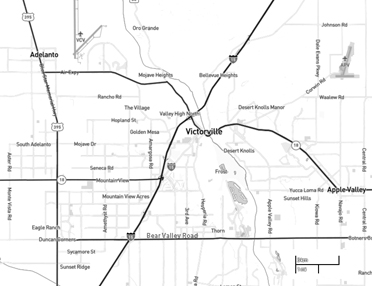
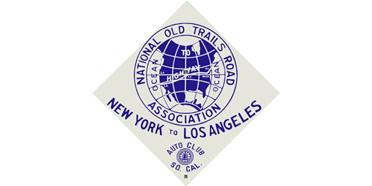
NOTR Victor Valley
Freeways & Highways
I-15 Freeway
U.S. 395
State Route 18
Historic Photos
Mojave Narrows Regional ParkMojave State Fish Hatchery
Spring Valley Lake
Bell Mountain
National Old Trails Road
Route 66
Route 66 Gantry
Salt Lake Wagon Road
Roy Rogers Museum
Romantic Heritage of Victor Valley
- Draft -
Victorville was literally tied to the coming of the railroad. The history started when Jacob N. Victor, construction superintendent of the Santa Fe Railroad, was overseeing the route through the Cajon Pass. A telegraph station and "Y" junction were established near the upper narrows of the Mojave River, naming it after him and thus, the beginning of Victorville. By that time, only a few buildings were standing around it, such as the Rogers log cabin and the J.C. Turner ranch.
As trains began passing through, a small community sprouted around the railroad activity. A few stores, a blacksmith shop, and saloons became the heart of the town's business district, which expanded westward. Mining in the area brought even more growth to the area with Victorville boasting one of the finest gold stamp mills of the time.
In 1901, the post office, to avoid confusion with Victor, Colorado, renamed the town Victorville. It soon enough became the biggest community in the Victor Valley now booming due to the increase in railroad traffic, mining, and agriculture. The town even became a favorite filming location, with over 200 movies filmed in the 1910s and 1920s for its Wild West scenery.
The cement plant, named the Southwestern Portland Cement Company and established in 1917, sealed Victorville's industrial boom and granted it the status of leading industry for the town. Following World War II, Victorville's clear desert air and high elevation attracted even more people, and a population surge was realized. The economy diversified, and resort communities, as might be expected, began popping up.
It was not until the 1920s that Victorville developed into a full-fledged town boasting of a weekly newspaper, a fiber plant working on materials from the Spanish dagger plant, along with schools, churches, and businesses. The agricultural base consisted of orchards, alfalfa fields, and heavy investment in cement manufacturing pioneered by the Southwestern Portland Cement Company and the Golden Gate Cement Company.
Today, Victorville remains a hub to Victor Valley and includes the San Bernardino County Fair, as well as much of its history, which also attracted its residents and visitors.